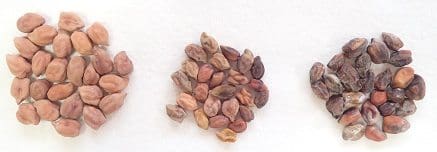CHICKPEA growers are being encouraged to have seed tested to assess germination and any impacts from frost or mould after a season marked by frosts and late rain.

Normal, frosted and mouldy chickpea seeds from this season. Growers are now being encouraged to send in chickpea samples for testing to assess germination quality and determine if seeds have frost and/or mould damage. (Photo: NSW DPI)
New South Wales Department of Primary Industries (DPI) senior plant pathologist, Dr Kevin Moore, said there had been reports of ‘field mould’ in chickpeas delivered to receival points following the recent harvest.
So, growers were now being encouraged to send in all chickpea samples, not just lots intended as planting material for 2018 crops.
“Some chickpea seeds loads have been discounted or rejected for having ‘field mould’,” Dr Moore said.
“So, we are encouraging growers to send samples of all chickpea seed into the DPI pathology unit for free testing to determine if field mould is present or if other factors, such as the frosts that occurred during August and September, have contributed to the discolouration.
“It is possible, in some cases it could be a combination of both issues, because if frosted seeds are exposed to moisture in-crop or during storage they are more prone to mould than non-frosted seeds.”
He said to date, one seed sample from the Narrabri region in northern NSW had been tested and the discolouration found to be more likely due to frost injury than mould.
Dr Moore said grower samples were vital to assist researchers capture as much information as possible to help determine the relative contributions of frost, immaturity and mould to this chickpea defect.
Data on defects
Capturing data about chickpea defects on the back of weather damage is also part of a collaborative Grains Research and Development Corporation (GRDC) and NSW DPI project focused on eliminating grain defects in chickpeas.
NSW DPI senior research scientist Dr Jennifer Wood is heading the research into chickpea seed quality and defects and said frosted grains were typically smaller, shrivelled and often darker brown in colour. Immature seeds can also have a similar appearance being small, shrivelled with green cotyledons.
Dr Wood said this season late rain on maturing chickpea plants in some regions had caused a flush of new growth and podding at the tops of mature plants, resulting in immature seeds at harvest.
She said both frosted and immature defective seeds were classified into the same defective seed category at receival with a maximum tolerance of six per cent by weight, including a maximum of two per cent poor colour.
“It is really important we get as much information as we can on this issue and ideally we would like samples from growers straight off the header.”
These samples will be tested by both Dr Moore (germination and pathology) and Dr Wood (non-pathological seed defects) as part of joint DPI and GRDC projects. There is no charge for this service.
Growers can send chickpea seed samples for free testing to the NSW DPI pathology unit at Tamworth for frost and mould testing.
Samples of harvested seed should be sent in 500-gram quantities and representative sample of the entire crop.
Information submitted with samples should include variety, location, date sown and harvested, flowering and maturity dates (if available) and weather events dates (if known) that could have stressed the crop in the field.
Samples need to arrive before the end of February 2018. This will ensure results are back to growers before next season planting.
Samples should be addressed to Dr Kevin Moore or Gail Chiplin, NSW DPI, Tamworth Agricultural Institute, 4 Marsden Park Road, Calala, NSW, 2340.
Source: GRDC

HAVE YOUR SAY